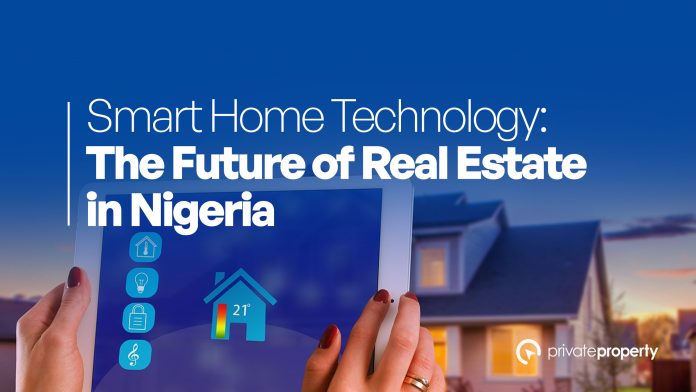In recent years, Nigeria’s real estate landscape has begun to embrace a powerful new trend that is redefining the way homes are built, sold, and lived in—smart home technology. What once seemed like a luxury reserved for high-end markets in cities like New York or Tokyo is now gaining traction in Nigeria’s urban centers, such as Lagos, Abuja, and Port Harcourt. As technology continues to permeate every aspect of our daily lives, smart home innovations are set to revolutionize the Nigerian housing sector.
What is Smart Home Technology?
Smart home technology refers to the integration of Internet of Things (IoT) devices and systems into residential spaces to enable automation, remote control, and enhanced energy efficiency. This includes things like smart lighting, climate control, security systems, voice assistants, and appliances that can be controlled via smartphone apps or automated systems.
For example, imagine being able to monitor your home’s security cameras from your office in real-time, or adjusting your air conditioning and lighting while you’re stuck in traffic on your way home. These capabilities are not just convenient—they offer improved safety, energy efficiency, and long-term cost savings.
Types of Smart Home Technology
1. Smart Security Systems
These are some of the most adopted technologies in Nigeria due to high demand for safety and surveillance.
- Smart Cameras (CCTV with remote access)
- Motion Sensors
- Smart Door Locks & Video Doorbells
- Alarm Systems connected to mobile apps
Example: Homeowners can monitor their gates or front doors via their smartphones and get alerts when unusual activity is detected.
2. Smart Lighting
Automated lighting systems help control brightness, color, and schedules.
- Motion-activated lights
- App-controlled or voice-controlled lighting
- Energy-efficient LED smart bulbs
Benefits: Reduces energy bills and adds convenience and security by simulating occupancy when residents are away.
3. Smart Climate Control
These systems manage heating, cooling, and ventilation.
- Smart Thermostats
- Automated Air Conditioning Units
- Humidity Sensors
In Nigeria: These can help manage power consumption, especially when paired with solar systems or inverters.
4. Smart Entertainment Systems
Control entertainment from one place.
- Smart TVs with voice control
- Integrated speakers (e.g., Sonos)
- Streaming hubs (e.g., Google Chromecast, Apple TV)
Use Case: A centralized app controls the sound system, TV, and lighting for an immersive movie night.
5. Smart Energy Management
Optimize power usage and monitor energy consumption.
- Smart Meters
- Solar Inverter Integration
- Energy Monitoring Apps
Importance in Nigeria: Helps manage power from multiple sources (PHCN, solar, generator) efficiently.
6. Smart Appliances
Connected appliances that can be controlled remotely.
- Smart Refrigerators
- Smart Washing Machines
- Smart Microwaves and Ovens
Trend: Still emerging in Nigeria, but gaining popularity among luxury homeowners.
7. Voice Assistants and Hubs
Central controllers for smart devices.
- Amazon Alexa
- Google Assistant
- Apple HomeKit
Role: These serve as the command center for all smart home gadgets, using voice or app control.
8. Smart Irrigation and Garden Systems
Useful for homeowners with gardens or landscaping.
- Automated watering systems
- Soil moisture sensors
Benefit: Saves water and keeps gardens healthy with minimal effort.
Why Now? The Rise of Smart Homes in Nigeria
Several factors are contributing to the rise of smart home technology in Nigeria:
Increased Smartphone Penetration: With over 170 million mobile subscribers and a growing smartphone user base, more Nigerians are equipped with the tools needed to interact with smart devices.
Tech-Savvy Youth Population: Nigeria has one of the youngest populations in the world. This generation is highly conversant with technology and more open to adopting new innovations.
Urbanization and Infrastructure Growth: As more people move into urban centers, there is an increasing demand for modern, secure, and convenient housing. Developers are beginning to incorporate smart features as a way to differentiate their properties.
Security Concerns: Nigeria faces security challenges, and smart home systems—such as automated gates, motion detectors, and real-time surveillance—offer peace of mind to homeowners and tenants.
Energy Management Needs: With the high cost of energy and frequent power outages, smart systems that optimize energy use or integrate with solar power are gaining popularity.
Benefits of Smart Home Technology in Nigerian Real Estate
1. Enhanced Security
Smart security systems can integrate CCTV cameras, motion detectors, smart locks, and doorbell cameras into one seamless platform. This is especially appealing in a country where safety is a key concern for homeowners and renters alike.
2. Increased Property Value
Properties equipped with smart technologies tend to command higher prices and attract more prospective buyers or tenants. Developers and real estate investors see this as a strategic way to increase ROI.
3. Energy Efficiency
Smart thermostats, lighting, and appliances can reduce energy consumption significantly. This is not only environmentally friendly but also financially beneficial in a country with high utility costs.
4. Convenience and Comfort
Homeowners can automate everyday tasks such as lighting, climate control, and entertainment systems. Voice assistants like Amazon Alexa or Google Home are beginning to gain interest among the Nigerian elite.
5. Remote Management
Smart homes can be managed remotely—ideal for property owners who travel frequently or manage multiple properties. It also supports remote diagnostics and maintenance.
Challenges to Overcome
Despite the promising future, the adoption of smart home technology in Nigeria faces some hurdles:
High Initial Cost: The cost of smart devices and installation can be prohibitive for the average homeowner.
Limited Technical Expertise: There’s a shortage of skilled technicians who can install and maintain smart systems.
Infrastructure Issues: Inconsistent power supply and unreliable internet connectivity can hinder the full functionality of smart homes.
Data Privacy Concerns: As with any connected technology, there are concerns around cybersecurity and data privacy.
Looking Ahead: Opportunities for Developers and Investors
As smart home technology becomes more affordable and accessible, it presents a huge opportunity for real estate developers and investors. Developers who integrate smart systems into their projects can offer a more compelling value proposition. Likewise, real estate agents and brokers can leverage this trend as a unique selling point.
Training and development in IoT technologies also offer a path to job creation. With the right support, Nigerian tech startups can begin to develop homegrown smart home solutions tailored to the local market.
Conclusion
Smart home technology is no longer a futuristic concept—it’s a present-day reality shaping the future of real estate in Nigeria. While challenges remain, the benefits are too significant to ignore. As more developers, investors, and homeowners embrace smart living, Nigeria is poised to become a leader in modern, tech-enabled housing on the African continent.









